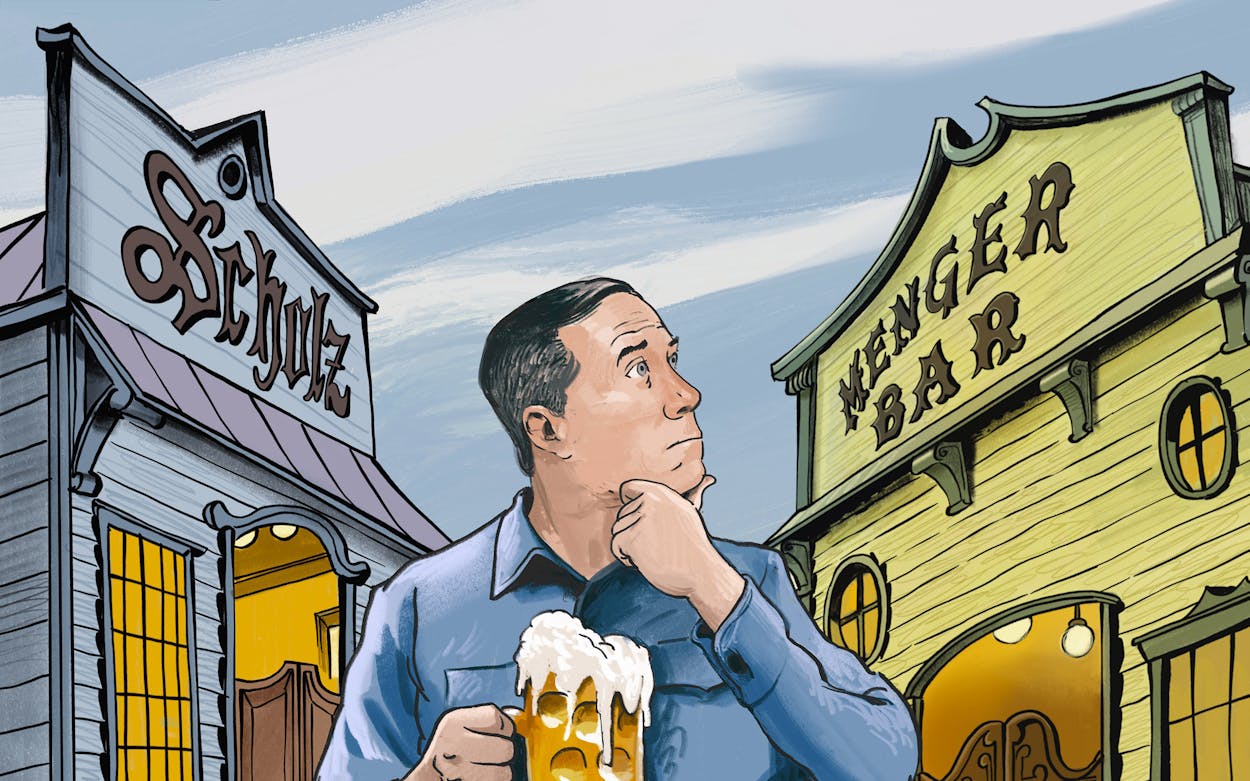Q: I often find myself at Austin’s Scholz Garten, which claims to be the oldest bar in Texas. But a bartender at the Menger Bar, in San Antonio, recently told me that it was the oldest. Can you help me sort fact from fiction for this illustrious title?
Matt Arth, Austin
A: The Texanist’s interests are many, but his attention is particularly piqued by matters involving history or mystery or—wait for it—a storied old drinkery. And what, lo and behold, have we here but a letter concerning all three: two historic watering holes seemingly ensnarled in something of a mystification. Thank you, Matt Arth, for this most stimulating of questions, which the Texanist aims to get to the bottom of, much as he does with most every libation placed before him.
As any Texan worth his or her margarita salt should be, the Texanist is familiar with both Scholz Garten and the Menger Bar, having brightened the doors of both establishments on numerous occasions over the years. But seeing as he has for the past several decades made his home in Austin, Scholz Garten, or simply Scholz’s, as the institution is known to its regulars, is the more familiar of the two. Sandwiched midway between the state capitol and the state’s flagship university, Scholz’s is, as the full name advertises, predominantly a beer garden, though there is a fairly sizable indoor barroom too. Founded in 1866, Scholz’s is notable for, among other things, its subtle German flair and for having been a frequent stop for the hard-partying characters in Texas Monthly alum Billy Lee Brammer’s 1961 political novel, The Gay Place, though in the book it was memorably dubbed the Dearly Beloved Beer and Garden Party.
All these years later, Scholz’s remains popular among those who toil in and around the Capitol complex and is equally beloved by UT students both present and past, especially on the football team’s home game days, when it is packed with burnt orange–clad fans. The Texanist, himself a Longhorn, whiled away many an afternoon at Scholz’s in the mid-eighties. A beer cost about a buck back then, and the garten featured a long line of tree-shaded horseshoe pits, since dismantled, on its north end. Oh, if only he had a nickel for every time he yelled “ringer” in those halcyon days of yore.
Seeing how the Texanist has less of a personal history with the Menger and had not bellied up to its bar in a number of years, he decided that he should take a trip to the illustrious River City establishment for the sake of a little refreshment . . . of his memory (rim shot). But on his way to San Antonio, he took a brief detour off Interstate 35 to check out Riley’s Tavern, a bar in tiny Hunter that he had heard tell also referred to itself as the oldest bar in Texas. Upon entering Riley’s, a low-slung joint with a pool table, plentiful cigarette smoke, and a nice patio area, the Texanist noted the following words on the outdoor stage’s hand-painted backdrop: “Riley’s Tavern. Since 1933. Oldest Bar in Texas.” “Hmm,” he thought to himself. Then he noticed that Riley’s also is adorned with a state-issued historical marker that explains that founder J. C. Riley procured the state’s very first post-Prohibition license to sell beer, number 00001. The Texanist scratched his head, slaked his thirst, and hit the road, a bit consternated that the mystery under review had grown only more mysterious since his researches began.
Upon his arrival in San Antonio, the Texanist quickly made his way to the renowned Menger Bar. Located off the historic hotel’s lobby, which is located off the even more historic Alamo Plaza, it’s a well-appointed replica of London’s House of Lords Pub—small, cozy, and handsomely dark. According to numerous signs hanging in and about the place, the bar was established in 1859 and is reportedly a spot where, in 1898, Teddy Roosevelt recruited Rough Riders for the Spanish-American War. Today it is frequented by a crowd that is notably less rough-hewn, mostly tourists. The Texanist, on his recent visit, overheard multiple parties slurping drinks and excitedly recapping their just-completed Alamo tours. Slurping a beverage of his own, he sat quietly at the end of the bar, lending only knowing nods.
Once he returned home, the Texanist began his final judging round by disqualifying Riley’s Tavern, because simply having procured the first post-Prohibition beer license in Texas does not necessarily the oldest bar in Texas make, especially given that both Scholz’s and the Menger Bar opened pre-Prohibition. Plus, Riley’s has changed hands at least once during those intervening decades, meaning it had to procure a new license at least once; it isn’t even in possession of the Oldest Continuously Held Bar License in Texas. (That honor, according to the good folk at the Texas Alcoholic Beverage Commission, belongs to San Antonio’s Rathskeller Bar, which has held on to its license since first acquiring it, in 1937.)
So how, then, to sort out the divergent claims of two truly legendary watering holes, both redolent with Texas history and both rightfully proud of their heritages? At the outset, it certainly seemed as if the Menger had the upper hand. The Texanist is neither a professional historian nor much of a mathematician, but even he can ascertain that 1859 (when the Menger allegedly opened) comes before 1866 (when Scholz’s allegedly opened). Yet appearances can be deceiving, even when the person perceiving those appearances hasn’t spent the past few days imbibing at one historic drinking establishment after another. As it turns out, while the Menger Hotel dates to 1859, the Menger Bar as we know it didn’t come into being until 1887. What’s more, during the dark Prohibition years, the bar apparently was disassembled and packed away and not unpacked and reassembled until 1949.
All of which is to say that though the Menger Bar is indeed a very, very fine old bar in Texas, it is not the oldest bar in Texas. The facts demand that Scholz Garten—having opened for business in 1866; having navigated Prohibition intact by serving patrons alcohol-free “Bone Dry Beer”; and having laid claim to the titles of “longest-running biergarten in America,” “oldest operating business in Texas,” and “oldest live music venue in Texas”—deserves the status without qualification. At least pending the appearance of any other surprise entrants the Texanist is currently unaware of. Until such a time, this is the Texanist’s final ruling.
And so with last call now upon us, our bender of a liquorological inquiry comes to an end. Cheers, Mr. Arth! Or, rather, prost!
Have a question for the Texanist? He’s always available here. Be sure to tell him where you’re from.
This article originally appeared in the June 2023 issue of Texas Monthly with the headline “The Texanist.” Subscribe today.
- More About:
- The Texanist
- Texas History
- Bars
- San Antonio
- Austin









